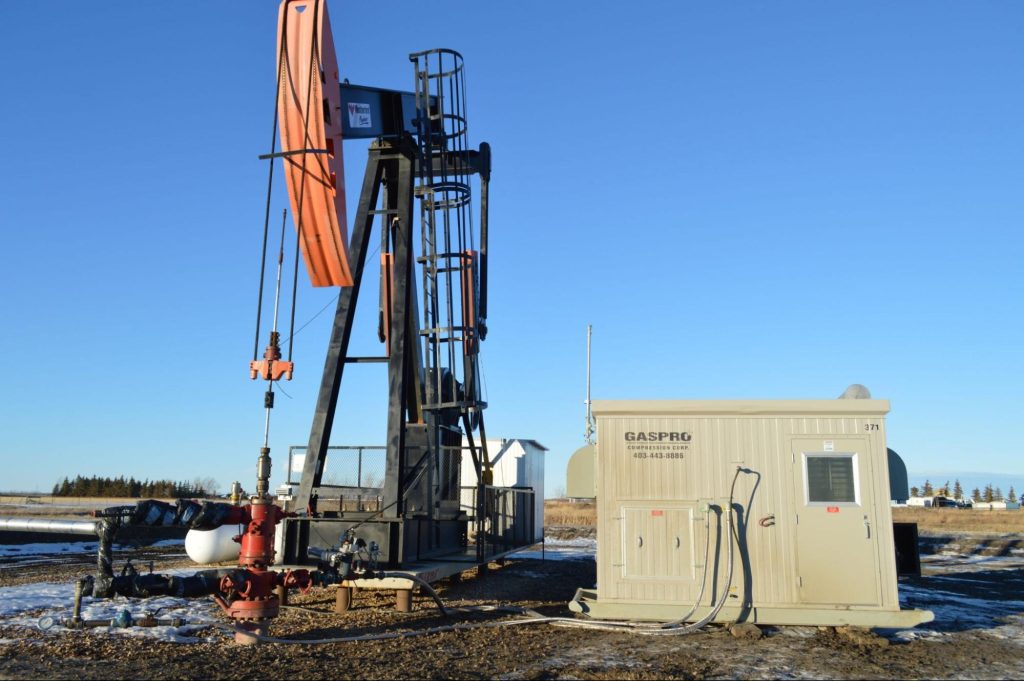
Industrial compressors are the backbone of countless industries, providing a reliable compressed air source to power operations of all scales. At GasPro Compression, we design and manufacture cutting-edge industrial compressors, ensuring your business gets equipment that meets its needs. Whether you’re in the energy sector, manufacturing, or transportation, our solutions guarantee optimal efficiency and performance.
In this article, we’ll look at what industrial compressors are, their types, applications, maintenance practices, and how GasPro offers unrivalled solutions.
What Are Industrial Compressors?
An industrial compressor is a specialized device that reduces the volume of gases or liquids while significantly increasing their pressure. This fundamental process is indispensable in various sectors, from oil and gas to food production and heavy machinery. At GasPro, we design industrial compressors that are not just powerful but also highly efficient, durable, and tailored to specific operational demands.
The role of industrial compressors goes beyond powering machines. They are critical in processes such as gas well boosting, vapour recovery, and casing gas management. Their versatility and dependability make them one of the most vital components in modern industrial setups.
The Science Behind Industrial Compressors
Energy Conversion in Compressors
Atmospheric air, when compressed, is stored under high pressure within a tank. This stored air represents potential energy, which converts into kinetic energy when released. This transformation powers tools, machines, and equipment with unmatched precision and consistency.
At GasPro, we integrate advanced technologies in our industrial compressors to optimize energy efficiency and minimize operational costs.
Core Components
An industrial compressor typically consists of the following:
- Compression Chamber: Where the air is pressurized.
- Inlet and Outlet Valves: For drawing in and releasing air.
- Drive Mechanism: Powered by electric motors or engines to facilitate compression.
- Storage Tank: To hold pressurized air.
Each component is crucial in ensuring the compressor operates smoothly under various conditions.
Types of Industrial Compressors
Choosing the correct type of industrial compressor is critical to achieving operational efficiency. GasPro provides an extensive selection of compressors tailored to meet your needs.
Positive Displacement Compressors
These compressors work by trapping air in a confined space and reducing its volume to increase pressure.
Reciprocating Compressors
- Single-Stage Compressors: Ideal for moderate-pressure applications, these devices compress air in one step before storage.
- Two-Stage Compressors: Designed for higher pressure requirements, these units use two compression stages to achieve the desired results.
Rotary Compressors
- Rotary Vane Compressors: Utilize rotating blades to compress air efficiently. Their compact design makes them suitable for limited-space installations.
- Rotary Screw Compressors: Equipped with helical screws, these compressors excel in continuous-use scenarios and are a popular choice in industrial settings.
Dynamic Compressors
Dynamic compressors differ from positive displacement models by using kinetic energy from a rapidly rotating impeller to increase air pressure. These are frequently utilized in large-scale industrial operations.
Advantages of Industrial Compressors
Investing in high-quality industrial compressors from GasPro has many advantages that enhance operational efficiency, reliability, and cost-effectiveness across industries.
Enhanced Efficiency
GasPro’s industrial compressors are crafted with advanced engineering to maximize energy efficiency. This reduces operational costs and minimizes energy waste, making them environmentally friendly.
- Optimized Design: The compressors feature state-of-the-art components that reduce friction and ensure smooth operation.
- Energy Management: With smart technologies, our compressors regulate airflow and pressure to match the exact needs of your equipment, preventing energy overuse.
- Continuous Performance: Whether running intermittently or continuously, our compressors maintain consistent efficiency over long periods.
Unmatched Versatility
Our industrial compressors are designed to excel in diverse applications, making them an indispensable tool across multiple sectors.
- Industrial Applications: Powering machinery, assembly lines, and automated processes in manufacturing.
- Liquid Transfer: Used in chemical processing and oil refining for moving liquids and gases.
- Portable Uses: Many models are compact enough for mobile operations, making them ideal for construction and fieldwork.
- Custom Solutions: We tailor our compressors to specific requirements, ensuring compatibility with unique industrial setups.
Exceptional Durability
GasPro’s compressors are engineered for durability, performing reliably even in the harshest conditions.
- Heavy-Duty Materials: Constructed from high-grade metals and corrosion-resistant components, our compressors endure harsh industrial conditions.
- Low Maintenance Requirements: With robust designs, downtime and maintenance needs are minimized.
- Performance in Extreme Conditions: Whether in high-heat settings, freezing temperatures, or high-humidity environments, our compressors perform reliably.
Scalability to Meet Your Needs
Whether your operations are small-scale or expanding rapidly, GasPro’s industrial compressors grow with your business.
- Modular Designs: Many compressors feature modular configurations, allowing for easy upgrades or capacity increases.
- Adaptable to Industry Changes: As your production processes evolve, our compressors can be reconfigured or scaled to meet new demands.
- Multiple Sizes and Capacities: From compact units for limited spaces to large-scale models for massive industrial applications, GasPro offers compressors suited to every need.
Significant Cost Savings
By choosing GasPro’s energy-efficient and low-maintenance industrial compressors, you reduce operational expenses and improve your bottom line.
- Lower Energy Costs: Advanced energy management systems optimize power usage, reducing electricity bills.
- Reduced Downtime: Reliable designs and minimal maintenance needs ensure uninterrupted operations.
- Extended Lifespan: Investing in a high-quality compressor means fewer replacements and repairs over time.
- Improved Productivity: With reliable equipment, businesses can achieve higher productivity and meet deadlines consistently.
Applications of Industrial Compressors
Key Industries Using Industrial Compressors
- Oil and Gas: Critical for processes like pipeline transportation and wellhead compression.
- Manufacturing: Powers machinery, assembly lines, and packaging operations.
- Construction: Drives tools like jackhammers, drills, and sandblasters.
- Food and Beverage: Assist in packaging, refrigeration, and aeration processes.
- Pharmaceuticals: Ensures sterile and precise processes in drug production.
- Automotive: Essential for spray painting and tire inflation.
Emerging Trends in Applications
With the rise of automation across industries, the need for smarter, more efficient industrial compressors is accelerating. Smart compressors equipped with IoT sensors now enable real-time monitoring, predictive maintenance, and energy optimization.
Maintenance Tips for Industrial Compressors
To maximize the performance and lifespan of your industrial compressors, adhere to these best practices:
- Follow Manufacturer Guidelines: Always use recommended parts and adhere to specified operating conditions.
- Frequent Inspections: Stay vigilant by monitoring for any signs of leaks, abnormal vibrations, or unexpected overheating.
- Filter Maintenance: Clean or replace air filters regularly to prevent clogging and ensure smooth airflow.
- Proper Lubrication: Keep all moving components well-lubricated to reduce friction and extend their lifespan.
- Professional Servicing: Engage certified technicians, like those at GasPro, for comprehensive maintenance and repairs.
Future of Industrial Compressors
Innovations driving the industry:
- Energy Efficiency: Modern compressors are designed to minimize energy usage while maintaining high performance.
- Automation: Smart compressors with integrated sensors are revolutionizing monitoring and maintenance.
- Eco-Friendly Designs: Manufacturers like GasPro are adopting sustainable practices to reduce the carbon footprint of compressor systems.
Choosing the Right Industrial Compressor
Selecting the ideal compressor requires understanding your operational requirements, such as:
- Pressure levels needed
- Volume capacity
- Frequency of use
- Environmental conditions
GasPro’s team works closely with clients to ensure they invest in the right solution.
Why GasPro?
At GasPro Compression, we go beyond selling industrial compressors. Our mission is to provide end-to-end solutions that empower your operations. Here’s what sets us apart:
- Custom Solutions: We design compressors tailored to your unique requirements.
- Expert Support: Our team of specialists provides guidance from selection to installation and maintenance.
- Unmatched Quality: Each product is rigorously tested to ensure maximum reliability.
GasPro’s Commitment to Sustainability
We are committed to developing industrial compressors that not only meet operational needs but also contribute to a greener future. By integrating advanced technologies, we ensure our products are both efficient and environmentally responsible.
Partner with GasPro Today
Your search for reliable, efficient, and durable industrial compressors ends here. At GasPro Compression, we pride ourselves on delivering solutions that drive success across industries.
Contact us today to discover more about what we offer and how we can help you! Our contact phone number is 403-443-8886.
